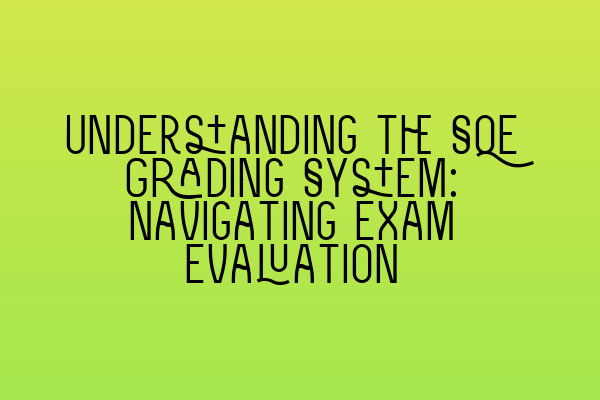Understanding the SQE Grading System: Navigating Exam Evaluation
If you’re gearing up for the Solicitors Qualifying Examination (SQE), it’s crucial to familiarize yourself with the grading system. The SQE grading system determines how your exam performance is evaluated and plays a significant role in your overall success. In this blog post, we will dive deep into understanding the SQE grading system, its components, and provide you with expert advice on how to navigate exam evaluation effectively.
Before we delve into the details, let’s quickly recap what the SQE is for those who are new to it. The Solicitors Qualifying Examination is a new centralized assessment that will replace the current Qualified Lawyers Transfer Scheme (QLTS) and the existing route to qualification, the Legal Practice Course (LPC). It is designed to ensure consistency and competency among solicitors in England and Wales.
Now, let’s explore the grading system of the SQE.
The SQE is divided into two stages: SQE1 and SQE2. Each stage consists of multiple assessments, and your performance in these assessments will be graded individually. The grading system follows a numerical scale ranging from 0 to 4.
SQE1 Grading System:
In SQE1, you will encounter assessments that focus on assessing your functional legal knowledge and practical legal skills. These assessments include multiple-choice questions (MCQs) and written tasks.
Multiple Choice Questions (MCQs):
MCQs form a major component of the SQE1 assessments. The grading for MCQs is as follows:
– Grade 4: A high level of understanding and application of legal knowledge.
– Grade 3: A good level of understanding and application of legal knowledge.
– Grade 2: A basic level of understanding and application of legal knowledge.
– Grade 1: Some understanding of legal knowledge, but application may be limited.
– Grade 0: Limited or no understanding of legal knowledge.
Written Tasks:
Written tasks in SQE1 might include legal research, drafting, and writing memoranda or letters. The grading for written tasks is as follows:
– Grade 4: Exceptional legal analysis, excellent drafting and writing skills.
– Grade 3: Good legal analysis, competent drafting and writing skills.
– Grade 2: Basic legal analysis, some drafting and writing errors.
– Grade 1: Limited legal analysis, significant drafting and writing errors.
– Grade 0: Insufficient legal analysis, extensive drafting and writing errors.
SQE2 Grading System:
SQE2 focuses on assessing your practical legal skills, including both written and oral skills.
Written Skills:
In SQE2, you will encounter assessments such as legal drafting, legal writing, advocacy, and case analysis. The grading for written skills is as follows:
– Grade 4: Exceptional legal analysis, persuasive writing, and comprehensive legal drafting.
– Grade 3: Good legal analysis, clear and cogent writing, and accurate legal drafting.
– Grade 2: Basic legal analysis, some issues with writing clarity, and some drafting errors.
– Grade 1: Limited legal analysis, significant issues with writing clarity, and drafting errors.
– Grade 0: Insufficient legal analysis, major issues with writing clarity, and extensive drafting errors.
Oral Skills:
Oral skills assessments in SQE2 may include client interviews, negotiations, case analysis discussions, and persuasive advocacy. The grading for oral skills is as follows:
– Grade 4: Excellent communication skills, concise and persuasive arguments, and effective questioning.
– Grade 3: Good communication skills, clear arguments, and suitable questioning to gather information.
– Grade 2: Basic communication skills, some issues with clarity, and limited probing.
– Grade 1: Limited communication skills, significant issues with clarity, and inadequate questioning.
– Grade 0: Poor communication skills, major issues with clarity, and ineffective questioning.
Now that we have a comprehensive understanding of the SQE grading system, let’s discuss some key strategies to help you navigate exam evaluation successfully:
1. Practice, Practice, Practice: Consistent practice is the key to mastering the SQE assessments. Make sure to utilize SQE mocks, as they provide realistic practice scenarios, allowing you to hone your skills effectively. You can find more information on SQE mocks in our related article: SQE Mocks Unleashed: Maximizing Your Preparation with Realistic Practice.
2. Focus on Understanding Legal Concepts: The SQE assessments evaluate your understanding and application of legal concepts. Invest time in comprehending the core principles and their practical implications. For further guidance, refer to our related article: Unveiling the Solicitors Qualifying Examination (SQE): What You Need to Know.
3. Time Management is Crucial: The SQE assessments have strict time constraints. Develop effective time management techniques to ensure you can complete each assessment within the given time frame. This will help you avoid unnecessary stress and improve your overall performance.
4. Stay Updated with Current Legal Developments: The legal profession is constantly evolving. Stay updated with the latest legal developments and ensure that your knowledge is up-to-date. Incorporate recent cases, legislation, and legal updates into your study routine.
5. Seek Guidance from Industry Experts: Working with experienced solicitors, tutors, or mentors can provide invaluable insights and guidance for your exam preparation. They can help refine your skills and provide constructive feedback on your progress.
Lastly, remember that the SQE exams are challenging, but with diligent preparation and the right approach, you can achieve a successful outcome. We recommend reading our related article on Tips for SQE Success: Key Pointers for a Stellar Performance to further enhance your preparation for the SQE exams.
In conclusion, understanding the SQE grading system is essential to navigate the exam evaluation process effectively. With the knowledge of the grading criteria for each assessment, paired with strategic preparation and practice, you can maximize your chances of success. Best of luck on your SQE journey!

Leave a Reply